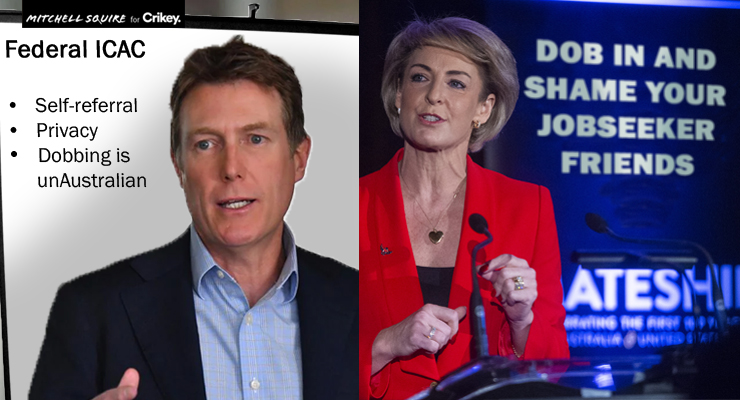
The Morrison government has managed to make Australia’s unemployment payments, already one of the lowest in the OECD, even worse.
A new hotline will allow employers to dob in jobseekers who turn down a role. Social Services Minister Anne Ruston once again used the dole bludger argument, saying both the hotline and the new rate — an increase of just $3.57 a day from pre-pandemic levels — will incentivise people to find work.
Advocacy groups have raised concerns dodgy employers will leverage their newfound power against unemployed people, forcing them into dangerous situations and unsuitable work.
A note on ‘dole bludgers’
The argument that people would rather cheat the system than find a job is an emotive one — but it is not backed by evidence.
Those working on the minimum wage will earn $443.40 more a week than on JobSeeker, which pays $310.40 a week.
The argument that business owners struggle to recruit staff because of a lack of applicants is also wrong: the government amplified anecdotal reports and cherrypicked responses from surveys.
Of 1.1 million jobseekers in the first half of last year, just 114 had their payments suspended for turning down work.
Open for manipulation
The hotline opens the gates for dodgy or sleazy employers to wield their power over the unemployed — a huge issue given Australia’s pervasive culture of workplace sexual harassment, Australian Council of Trade Unions’ president Michele O’Neil tells Crikey.
“[The hotline] gives a huge amount of power to employers to coerce vulnerable people into jobs under threat of being cut off from payments,” she said.
“We need to help workers find secure jobs with good pay, not force them into any job being offered at the lowest possible wage.”
Kristin O’Connell from the Australian Unemployed Workers’ Union says the government’s logic is “ludicrous”.
She says it instilled fear in jobseekers that their payments might be delayed or come late even when they haven’t done the wrong thing. Late payments often force people to choose between food and medicine.
“This is why job agencies have been able to get away with bullying and threatening people and forcing them to do things like work for the dole for so long,” she said.
“That desperation isn’t going to change, and that’s what allows people to be manipulated.”
Unsuitable work for people with disabilities
Crikey has previously revealed many people with disabilities are put forward for unsuitable jobs by specialist disability employment providers.
“People are going to be having even less ability or confidence to push back and say no when they know that work is unsafe for them,” O’Connell said.
Disability employment providers are paid based on how many positions they put their clients forward for, says Peter Smith, director of the Centre for Disability Employment Research and Practice.
“It’s a you-throw-mud-at-a-wall-and-some-of-it-will-stick-type approach,” he said.
“If you’re being put forward for jobs that are not appropriate for you and not suitable for you, you’re clearly not going to take them up and you clearly are not going to meet some of the guidelines to retain your benefits.”








From mateship to hateship, as the majority of the population is threatened and bullied, and made to cower in fear of their own government. “Dob in a mate” is so very Stasiland. After too many years in power, governments start to view the populace as the enemy, the problem that needs solving. I only hope that at the next election, we choose to salvage our freedom rather than continue down this road to submission.
“A fair day’s wage . . for a fair day’s work” Well forget that. Meanwhile, waiting in wings, salivating, Michaela Cash. Oh the ‘Press’ opportunities. Thank you Prime Minister Scot… Sir! Persecution legitimised!!!
Let’s start a ‘dob in an employer that has used this hotline to dob in an unemployed worker’.
While we’re there, let’s start up a list of employers who are willing to vouch that any unemployed person came to them asking for work, to satisfy the unemployment job seeking requirement.
I’d like to never spend another cent at the former, and spend whatever discretionary money I have at the latter.
How about a hotline where the jobseeker can dob in a potential employer who seems like a jerk at the interview? No, I thought not.
How about a dob in line for sexually harrassed Liberal females for complaints against the bosses who prefer to ignore the problem?
Assume there is no JobKeeper hotline to dob in an employer rorting the same?
So the stick of living below the poverty line isn’t enough?! Instead we need a second stick? To me this suggests they don’t believe in the carrot of a living wage.
This is why I abhor welfare politics. We’re leaving people in poverty willingly, convinced that those living well below the poverty line are taking the rest of us for a ride. It’s a horrible way to treat our fellow citizens, subjecting them to humiliation in addition to desperate circumstances.
THIS GOVERNMENT IS BASED ON 3 THINGS, LIES, DAMN LIES AND STATISTICS, this is Scomo`s 3 commandments.
Well, since this bunch of bludgers hardly put in even part-time hours last year, why are they still getting full-time pay? And yet it’s still not enough for them so the cheay on their lunch allowances and awsy from home allowances, some by putting their partners name on a house/apartment in Camberra so they can pay them for staying there and paying off their mortgage by tax-payer – yet again.
If there’s a hell, it must surely have a specially deep and hot pit for corrupt politicians.
Daibhin
What is the hotline for the dobs?
I want to follow your advice and dob in a few pollies.